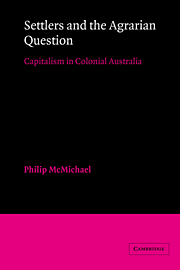Book contents
- Frontmatter
- Contents
- List of tables
- Preface
- 1 The social structure of British hegemony
- PART I THE COLONIAL ECONOMY ENTERS THE WORLD MARKET (1788–1830)
- PART II THE SQUATTING PHASE OF PASTORALISM (1830s AND 1840s)
- 4 Squatting and colonial politics
- 5 Merchants and growers
- 6 Pastoral enterprise in the colonial economy
- 7 The conservative character of pastoralism
- PART III CONFRONTING THE AGRARIAN QUESTION (1840–1900)
- APPENDIXES
- References
- Index
7 - The conservative character of pastoralism
Published online by Cambridge University Press: 18 December 2009
- Frontmatter
- Contents
- List of tables
- Preface
- 1 The social structure of British hegemony
- PART I THE COLONIAL ECONOMY ENTERS THE WORLD MARKET (1788–1830)
- PART II THE SQUATTING PHASE OF PASTORALISM (1830s AND 1840s)
- 4 Squatting and colonial politics
- 5 Merchants and growers
- 6 Pastoral enterprise in the colonial economy
- 7 The conservative character of pastoralism
- PART III CONFRONTING THE AGRARIAN QUESTION (1840–1900)
- APPENDIXES
- References
- Index
Summary
INTRODUCTION
In Chapter 6 we examined the character of pastoral enterprise in the squatting period and its contribution to the division of labor within the colonial economy. Here we shall consider pastoralism from a different angle, in order to understand the pastoral ideology. Rather than focusing on the individual unit of production, an analysis of the social environment of pastoralism may show how pastoralists perceived themselves. As wool growers, they confronted a particular set of economic conditions, and their attempt to control these conditions necessitated political solutions. The goal here of connecting conditions and solutions is to discover the social origins of the ideology expressed by the dominant growers.
Pastoral ideology in colonial Australia altered with the impact of squatting. The pioneering gentry (landowning graziers) saw themselves as the patriarchs of a stable social hierarchy, with the possibility of creating a colonial aristocracy sustained by the British state. Once squatting took hold, however, a more materialist ideology displaced the traditional conception. Squatters, whose self justification arose from their productive occupation of imperial wastelands, emphasized their economic value to colony and empire alike. In the attempt to forge a political hegemony in the colony against the Wakefieldian influence in imperial legislation, for example, the large landowning squatters' Pastoralist Association resolved in 1844 “that the Commercial and Trading classes of the community are most intimately connected with, and dependent upon the prosperity of the great Pastoral interests of the colony.” The squatting ideology was a neomercantilist view of the colonial economy as a staple producer supported by British government policy.
- Type
- Chapter
- Information
- Settlers and the Agrarian QuestionCapitalism in Colonial Australia, pp. 145 - 164Publisher: Cambridge University PressPrint publication year: 1984



